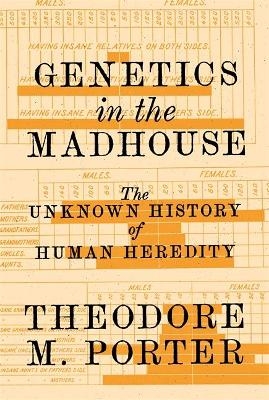
Genetics in the Madhouse
The Unknown History of Human Heredity
Seiten
2018
|
New edition
Princeton University Press (Verlag)
978-0-691-16454-0 (ISBN)
Princeton University Press (Verlag)
978-0-691-16454-0 (ISBN)
The untold story of how hereditary data in mental hospitals gave rise to the science of human heredityIn the early 1800s, a century before there was any concept of the gene, physicians in insane asylums began to record causes of madness in their admission books. Almost from the beginning, they pointed to heredity as the most important of these
The untold story of how hereditary data in mental hospitals gave rise to the science of human heredity
In the early 1800s, a century before there was any concept of the gene, physicians in insane asylums began to record causes of madness in their admission books. Almost from the beginning, they pointed to heredity as the most important of these causes. As doctors and state officials steadily lost faith in the capacity of asylum care to stem the terrible increase of insanity, they began emphasizing the need to curb the reproduction of the insane. They became obsessed with identifying weak or tainted families and anticipating the outcomes of their marriages. Genetics in the Madhouse is the untold story of how the collection and sorting of hereditary data in mental hospitals, schools for "feebleminded" children, and prisons gave rise to a new science of human heredity.
In this compelling book, Theodore Porter draws on untapped archival evidence from across Europe and North America to bring to light the hidden history behind modern genetics. He looks at the institutional use of pedigree charts, censuses of mental illness, medical-social surveys, and other data techniques--innovative quantitative practices that were worked out in the madhouse long before the manipulation of DNA became possible in the lab. Porter argues that asylum doctors developed many of the ideologies and methods of what would come to be known as eugenics, and deepens our appreciation of the moral issues at stake in data work conducted on the border of subjectivity and science.
A bold rethinking of asylum work, Genetics in the Madhouse shows how heredity was a human science as well as a medical and biological one.
The untold story of how hereditary data in mental hospitals gave rise to the science of human heredity
In the early 1800s, a century before there was any concept of the gene, physicians in insane asylums began to record causes of madness in their admission books. Almost from the beginning, they pointed to heredity as the most important of these causes. As doctors and state officials steadily lost faith in the capacity of asylum care to stem the terrible increase of insanity, they began emphasizing the need to curb the reproduction of the insane. They became obsessed with identifying weak or tainted families and anticipating the outcomes of their marriages. Genetics in the Madhouse is the untold story of how the collection and sorting of hereditary data in mental hospitals, schools for "feebleminded" children, and prisons gave rise to a new science of human heredity.
In this compelling book, Theodore Porter draws on untapped archival evidence from across Europe and North America to bring to light the hidden history behind modern genetics. He looks at the institutional use of pedigree charts, censuses of mental illness, medical-social surveys, and other data techniques--innovative quantitative practices that were worked out in the madhouse long before the manipulation of DNA became possible in the lab. Porter argues that asylum doctors developed many of the ideologies and methods of what would come to be known as eugenics, and deepens our appreciation of the moral issues at stake in data work conducted on the border of subjectivity and science.
A bold rethinking of asylum work, Genetics in the Madhouse shows how heredity was a human science as well as a medical and biological one.
Theodore M. Porter is Distinguished Professor of History and holds the Peter Reill Chair at the University of California, Los Angeles. His books include Karl Pearson: The Scientific Life in a Statistical Age, Trust in Numbers: The Pursuit of Objectivity in Science and Public Life, and The Rise of Statistical Thinking, 1820–1900 (all Princeton). He lives in Altadena, California.
| Erscheinungsdatum | 12.06.2018 |
|---|---|
| Zusatzinfo | 20 b/w illus. |
| Verlagsort | New Jersey |
| Sprache | englisch |
| Maße | 155 x 235 mm |
| Themenwelt | Geisteswissenschaften ► Geschichte |
| Studium ► 2. Studienabschnitt (Klinik) ► Humangenetik | |
| Naturwissenschaften | |
| ISBN-10 | 0-691-16454-1 / 0691164541 |
| ISBN-13 | 978-0-691-16454-0 / 9780691164540 |
| Zustand | Neuware |
| Informationen gemäß Produktsicherheitsverordnung (GPSR) | |
| Haben Sie eine Frage zum Produkt? |
Mehr entdecken
aus dem Bereich
aus dem Bereich
Eine sehr persönliche Geschichte | Der New York Times-Bestseller
Buch | Softcover (2023)
Ullstein Taschenbuch Verlag
21,99 €
Die revolutionäre Medizin von morgen (Lifespan)
Buch | Softcover (2020)
DuMont Buchverlag
16,00 €


